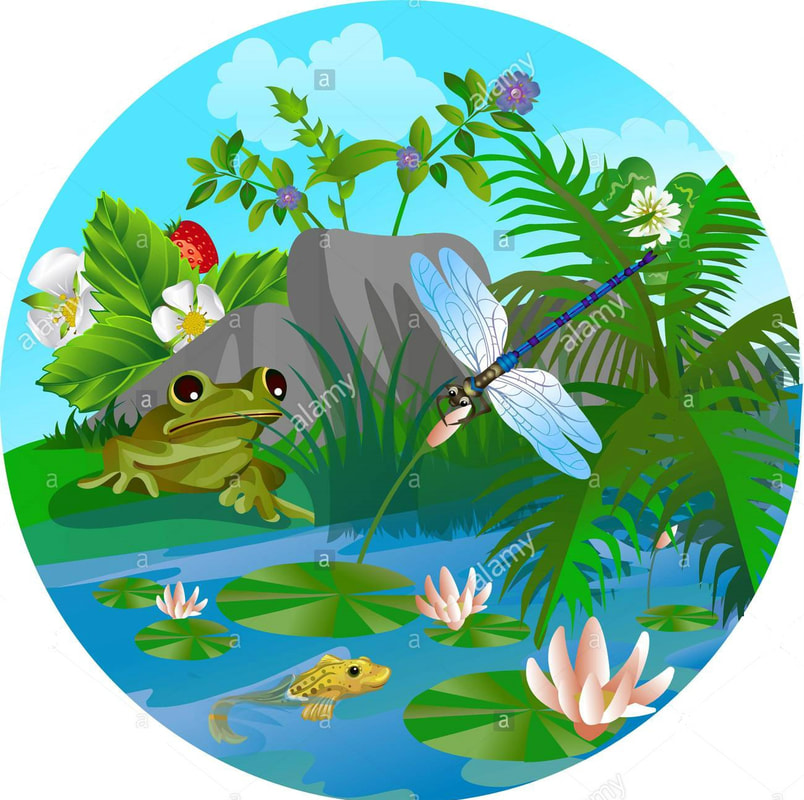1. Does your backyard really need landscaping? If you've recently moved into a new property or inherited a house, you may feel the urge to have it landscaped. maybe you've lived in your existing home for a long time and think the backyard (garden area) could use some sprucing up. It's tempting, I know, to want to chop down unsightly trees, pull up those weeds and ivy, or put in new drainage to eliminate puddles and marshy areas. But experts tell us that unless these issues pose a real health risk to you, it's best to to leave these natural occurrences alone. Why? Because these places could be home to birds, squirrels, frogs and toads, as well as other wildlife that you may not even know about. If you absolutely must landscape, do it gently and thoughtfully, in such a way as to not drive off these beautiful critters. If you chop down a tree, replace it with a new one and build a couple of bird house. If you drain the marsh, think about adding a beautiful pond for the frogs and toads to call home. You get the idea!
2. Keep your cat indoors. Many cat lovers profess to loving wildlife yet they allow their cat to go outside. Cats are natural hunters and a single cat can kill many birds, rodents, and lizards. I love cats a bunch. I have many cat friends. But I also know that they can be cruel with their prey, often playing with their catch before finally killing it. And placing a bell on their collar won't help. Cats are smart. They'll learn how to walk and stalk in such a way that the bell won't tinkle, warning their potential victims. The solution? It's not unkind to keep tabby in the house. Really, it isn't. Ask your vet. The animals will thank you!
3. Don't feed any animals other than birds. By feeding the deer, raccoons, possums and other wildlife that stray into your yard, you're teaching them that humans are kindhearted. Many of you are, thank goodness. But there are always a few that won't appreciate them ambling onto their property. And instead of greeting them with food, they'll get greeted by a shotgun! Feeding the birds, is okay...unless you persist on letting tabby out of he house.
4. Turn off that bug zapper! I know humans don't appreciate mosquitoes as much as we frogs do, but that doesn't justify electrocuting them with bug zappers. It's a fact that the light and heat from tiki torches and bug zappers will not only attract the bugs in your immediate area, but will also attract far-away bugs that never had any intention of biting you. Killing off all these bugs means you're depriving the birds, lizards, frogs, and spiders of a nice meal. It takes a very compassionate human to do this, but please be kind and use an all-natural bug repellent instead of zappers!
5. Clean up litter, even the stuff that's not your own. If you love wildlife, then you already know that litter can be harmful to small creatures. So when you are picking up your own trash at the picnic or campsite, please be extra thoughtful and pick up whatever else might be lying around. Small animals can become trapped, or injured, by this debris and that makes them easy targets for potential predators. And, of course, when the mounds of trash and garbage get too big, it can result in the near complete loss of their habitation. Besides, trash is ugly to look at.
6. Plant a garden and provide water. Granted, if you go to all the trouble to plant a lovely garden, you won't want insects and animals coming 'round to destroy it. The interweb is loaded with websites, though, that can teach you how to plant a garden that will nourish and protect birds, bees, and butterflies...without aiding too many of the other "B" critters. Yep, I'm talking about bugs. It's a good idea to make sure that there is fresh water available, especially during the heat of summer, when animals can have a hard time finding water. You may not realize it, but animals need water in the wintertime, too. So be sure to see there's water available then, as well. Water can breed problematic mosquitoes, but they are less likely to hand around if the water isn't stagnant. Consider installing a pump in your garden's pond. It'll help with the freezing water issue, too.
7. Want to go a step further? Why not set up your own refuge by installing birdhouses and keeping them stocked with bird seed in the winter months. Or invest in some bee-keeping equipment. Installing a pond in your garden can be a refuge for frogs and toads. One word of caution, however. Before you begin one of these projects, be sure to check with your local community regards laws and regulations.
8. Join a wildlife conservation group. There are many to choose from. Each group will have different goals and objectives. Find the one that appeals to you and join. Many communities have their own local groups and refuge centers. They are always in need of volunteers. It's a great way to help the animals and you'll always have something important and useful to do with your extra time!
I hope these tips have inspired you to do what you can to help wildlife. We're counting you for our future existence. Please be kind to critter neighbors.

 RSS Feed
RSS Feed